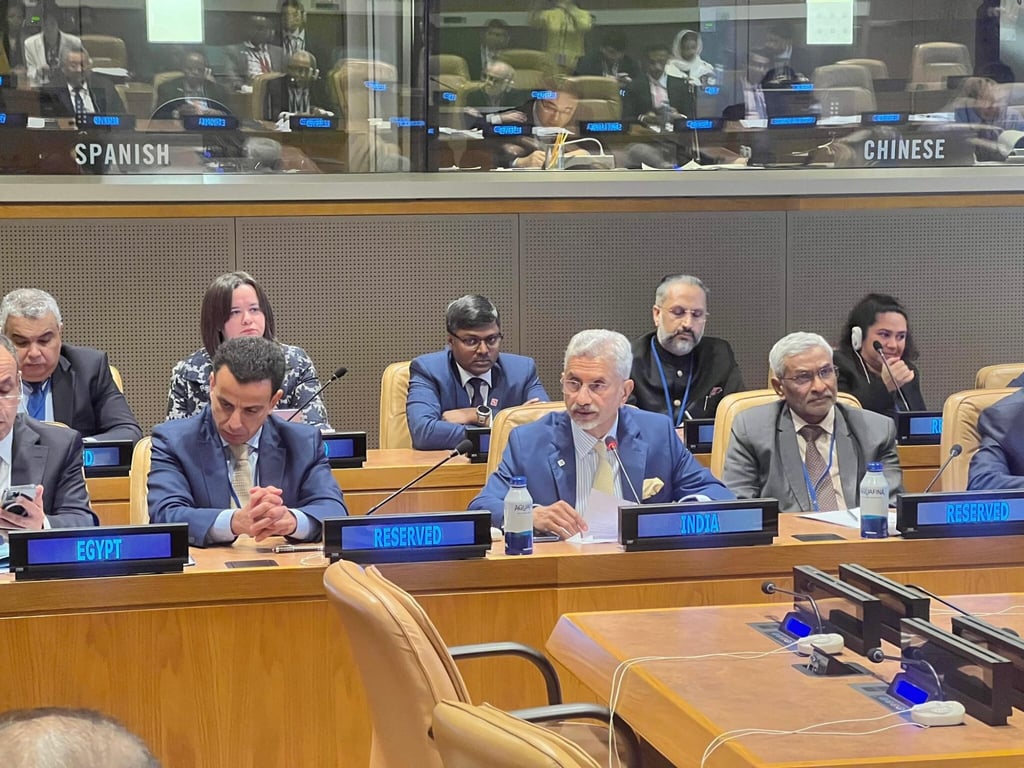
A meeting of Brics foreign ministers in New York on Thursday ended without a joint statement for the first time since the group’s founding, reflecting difficulties reaching a consensus with the addition of new members last year.
The meeting convened on the sidelines of the United Nations General Assembly and was expected to produce a 52-paragraph text on several issues, including the Middle East conflict, plans for a common currency and preliminary talks on the accession of more Brics countries to the summit slated for October in Kazan, Russia.
But according to reports from Brazilian news portal UOL, independently confirmed by the Post, the meeting ended in a stalemate.
One condition set by Indian and Brazilian diplomats for the bloc’s expansion last year was that the new members support the aspirations of India, Brazil and South Africa for permanent seats on the UN Security Council, the Brazilian website added.

However, at Thursday’s meeting, Egypt and Ethiopia refused to sign the communique mentioning the issue on the grounds no consensus had been reached as to which country should be Africa’s representative on the UN’s highest body.
Brazilian Foreign Minister Mauro Vieira, who chaired Thursday’s meeting, argued that both countries understood the condition under which they had been accepted into Brics last year.
In view of the Egyptians’ and Ethiopians’ stance, he decided to end the meeting.
Joel Souza Pinto Sampaio, who leads Vieira’s communications team, confirmed the impasse in New York but refrained from elaborating on the meeting’s specifics.
“There was no consensus here,” Sampaio told the Post. “Our sherpas will continue working to reach a consensus until the summit in Kazan next month.”
Sherpas are diplomats responsible for negotiating details ahead of major international summits or conferences.
Another person familiar with the matter described the situation as a “serious disagreement”.
The Chinese and Indian missions in New York did not immediately respond to questions about the stalemate.

Subrahmanyam Jaishankar, New Delhi’s foreign minister, refrained from mentioning it when after the meeting he posted on X, formerly Twitter, saying the ministers “focused on reforming multilateralism and strengthening development”.
Created as Bric in 2006 with Brazil, Russia, India and China as its founding members, Brics came into being after South Africa joined the bloc in 2010.
Last year, Egypt, Ethiopia, Iran, Saudi Arabia and the United Arab Emirates were invited to become members with effect from January 1, 2024. Riyadh has yet to confirm its membership.
The Brics leaders’ summit, taking place from October 22 to 24, will be only the second since the group’s expansion in January.
Reaching consensus on issues, however, could prove more elusive as the group of non-Western countries adds to its ranks.
Russian President Vladimir Putin at a meeting in St. Petersburg in June said 34 countries had shown interest in joining the bloc “in one form or another”.
Putin at the time said Russia wanted to address this “growing interest” and discuss how new members could participate. Azerbaijan, Malaysia, Thailand and Turkey are among the countries that have now formally applied for full Brics membership.
Ankara sent observers to a Brics summit in South Africa in 2018 and its application is expected to be considered at the coming summit in October. If approved, Turkey would be the first Nato member to join Brics.
Following Thursday’s Brics meeting, Russia and Turkey were expected to meet separately with Egypt and Ethiopia.

Be the first to comment